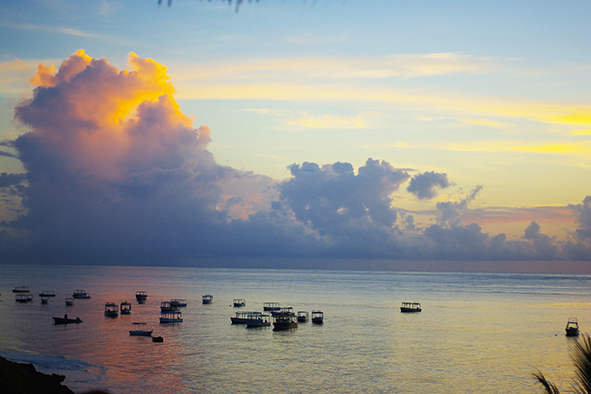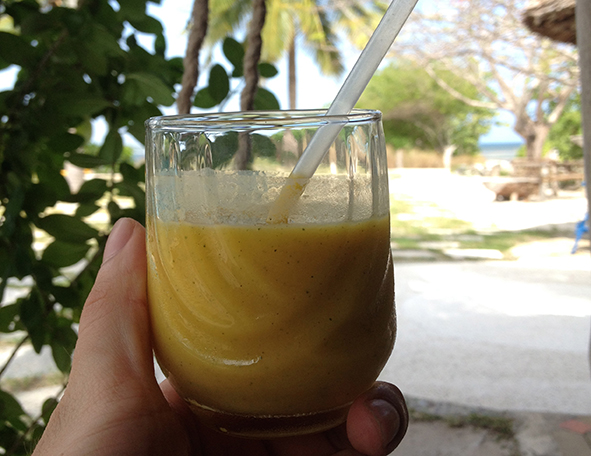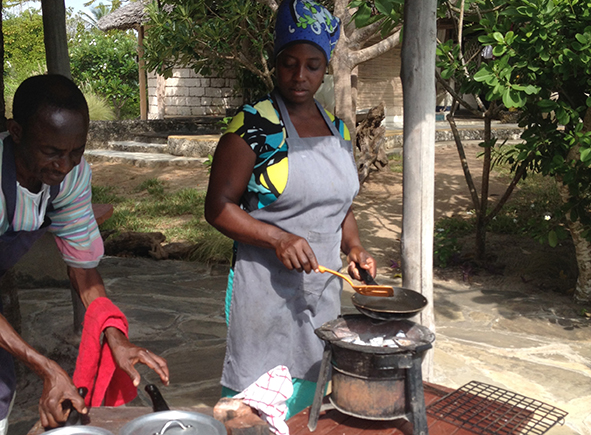Kenya’s dazzling East Coast is made up of the stuff you dream about: wildly patterned shells lapped by warm sea-waves; wind-swept palms framed against an ocean of stars; exquisite fresh seafood served with the spices that coloured the history of the coastline. Sadly, over-development and the perceived dangers of the region have blighted the reputation of towns like Malindi. But one can still visit this delicate destination in a capacity that’s both environmentally sustainable and beneficial to the local community, whilst encountering adventures along the way.

Sunset in Malindi (Photo: Xiaojun Deng via Flickr)
“Hakuna matata,” he said gently, his voice thick as honey, his palms open, a gentle smile playing over his wizened face. This most famous of Swahili phrases was popularised by the Disney film The Lion King, but for me it carried a great deal more meaning when offered by our gentle host a Malindi local.
We bid him “asante sana” and he left us to enjoy our breakfast, a simple but divine spread of fresh mango, banana and natural yoghurt.
I was here on the East Kenyan coast with my sister, brother-in-law, their exceptionally jolly baby girl Betty (who had already succeeded in smearing her forehead in yoghurt) and my mum (who fortunately had not). We had opted to stay some way around the coastline from the more touristy beach of Watamu, in a remote eco-resort in Mida Cove called Manfriday’s.
A long term project of Sonya, a South African who had fallen in love with the area years ago, Manfriday’s was a quirky kind of paradise, the very definition of hakuna matata; a place of no worries. It was a spacious, rather endearingly ramshackle complex of swaying palms and beach huts, bead-curtains jingling in the warm wind, salt-water swimming pools (as a natural alternative to chlorine) and swinging hammocks. The furnishings were all crafted with local wood by local hands and it was a venture that strove to provide for the local community.
Manfriday’s opened out onto a white sand beach, strewn with seaweed and easily-alarmed crabs, which would flee at the first glimpse of a shadow. Beyond that was the Indian Ocean – a body of water synonymous with abundant life and tropical heat, colourful history and culture-shaping trade routes.
But as beautiful as our destination was, there was one rather unusual thing about Manfriday’s: we were the only guests.

The taste of paradise – fresh fruit smoothies (Photo: Dan Ayres)
A Troubled Slice of Paradise
Sadly, although “hakuna matata” was easily uttered by the affable staff, there was an undercurrent of troubles affecting Malindi which had resulted in lower visitor numbers.
The rise of Al-Shabaab in neighbouring Somalia has led to terrorist incidents throughout Kenya, and though Malindi and its resorts have never come under attack directly, there have been arrests in the region, as militants aim to radicalise vulnerable, poor, young Muslims in Kenyan coastal towns. Despite a warning on travel to certain regions in Kenya not being extended to Malindi, the fear is there, and tourism has been hit.
The knock-on effect from this has been to exacerbate existing problems for Malindi, including the long running history of illegal but widely practiced sex tourism. With many of the legitimate jobs in the tourism industry being cut, vulnerable women and girls may become embroiled in this dangerous practice in an effort to make a sustainable living.
The main stretch of beach in Malindi was in Watamu, across the bay from where we stayed. This dazzling stretch of white looked like something out of a glossy holiday brochure: package-holiday palaces, buzzing jet skis and Europeans (mostly Italians) frazzling themselves whilst intermittently chowing down on pizza. It’s also the place where the sex tourism is most prevalent, the effects of which have tarnished the resort’s reputation and left lasting scars on the vulnerable individuals involved.
It was difficult not to find this decadence jarring, when compared with the economic struggles faced by many of the Swahili people in the area. But here, across the bay at Manfriday’s, I found myself spending the days falling in love with this scruffy little slice of paradise on the East Kenyan coast.
A Malindi love affair

Skewered seafood, freshly caught and grilled, served with mango salad (Photo: Dan Ayres)
Every afternoon when the tide rolled out, a shallow expanse of shimmering gold was left in its wake, complete with pockets of temporary rock-pools brimming with ocean treasures. I spent hours wading through the shallows, inspecting shells patterned like wildcats and little creatures I couldn’t easily identify, whilst being careful to avoid stamping down on a rogue sea urchin. At one point I felt that I was being watched, and looked up to see an entire herd of goats, hunkering down in the shadow cast by a cliff-face, eyeing suspiciously this mad, hopping Englishman in the midday sun.
The animal intervention didn’t cease there. On returning to my hut, I saw a flash of colour scatter across the sand and disappear into the shrubbery. I snuck in closer and spied what looked like a sizeable wingless dragon, flicking its forked tongue in and out. Sonya confirmed later this was a monitor lizard, one of many that would emerge to bask its cold-blooded body in the pools of sunshine.
I adored the slow passing of the days, the abundance of reading, seeing baby Betty toddle around from one patch of shade to another. I liked the lack of wifi, the warm coastal wind and the gentle creaking of the hammocks. I liked the kindly staff, all of whom were hired locally by the business, providing a decent livelihood in an area struggling with falling employment levels. I especially liked our security guard, inexplicably named Zero; a giant, imposing figure who walked around in military regalia whilst brandishing a machete, but who was always quick to flash a big smile our way.
Not to mention the food. The food. The meals here were always cooked outside on a grill, often featuring skewered fish cooked with local spices, coconut rice and fruit salad.
The meals were often accompanied by a tasty, slightly bitter dark green vegetable called moringa. Sonya explained to us that, with visitor numbers lower than in years previously, she had begun growing and farming moringa to provide alternative and regular work for the staff. Deemed a so-called ‘superfood’ in the West for its abundance of health benefits, the moringa business was booming where tourism had begun to suffer.

Coastal cooking by Swahili experts (Photo: Dan Ayres)
A forest excursion
Refreshed and revitalised by the Indian Ocean, the East African sunshine and the vitamin-packed moringa, my family and I decided to set off on an adventure. We explored the Arubuko Sokoke National Park, the largest fragment left of coastal forest that once stretched for many miles across the East African coastline, but which has been largely decimated to clear land for living space and agriculture, making this remaining section all the more special.
Guided by the knowledgeable and rather cheeky Johnson, the trip began well, with the spotting of two golden-rumped elephant shrews, bounding through the ancient woodland.
As we got further into the forest, the heat began to rise, baby Betty grew disgruntled and we found ourselves bombarded by a bunch of tsetse flies whilst climbing up a precarious, half-rotten platform that ensnared a baobab tree.
When we safely descended, in an effort to lift the mood, Johnson whipped out an intricate section of an ebony tree, holding it in different positions and asking what shape it reminisced.
“Hammer? Cat? …Tree?” we chorused, as he switched it around in the air. Then, with a mischievous twinkle in his eye, he held it to his crotch.
“Vagine” he declared with a grin. This was enough to make us boys cackle like hyena after inhaling nitrous oxide, and the ladies to raise their eyebrows to the forest canopy, but did little to cool the slowly boiling baby.
This light-hearted approach to life seemed a recurrent trend in the Swahili folk we met here, and I couldn’t help but let it enrich my affection for both the people and the nature I encountered in Malindi.

A precarious platform. Exploring baobabs in the coastal forest (Photo: Dan Ayres)
The setting sun
For me, the purest beauty of Malindi and the East Kenyan coast was to be found in the resplendent nights, where the stars were ethereal, the wind soared through the palms and the ocean shone silver.
One evening, whilst stood out on the terrace brushing my teeth, I felt a presence sidle up to me. It was Zero, the gargantuan security guard. He leaned down to my ear.
“The moon has risen,” he purred, and gestured for me to follow him. I obliged, rather gingerly, dressed only in my boxer shorts and with the toothbrush still protruding skyward at a right-angle. I found him on the beach, staring out to the horizon. The moon had indeed risen, and it was magnificent: a mammoth silver orb emerging from a bed of low-lying mist out at sea.
This special moment was disturbed by just two things. The electric, orange canopy that formed an umbrella of light over the resorts of Watamu, and the gentle but persistent buzzing of my battery-powered toothbrush, which was stuck on vibrate.
Still, I reflected that, though Malindi was not without its troubles, it was a shame that travellers were opting to stay away from the region. It’s a place where local communities need decent, reliable occupations within tourism to create a sustainable livelihood. And it can be a place of smiles and exquisite cuisine; kind, surprising and good-humoured local people; a place where you can still carve out your own kind of paradise if you just seek it out.
With Zero at my side and the Indian Ocean stretching out before us, I knew the old Swahili mantra could never be more apt than at a time like this. Hakuna matata. No worries.